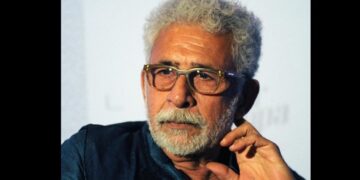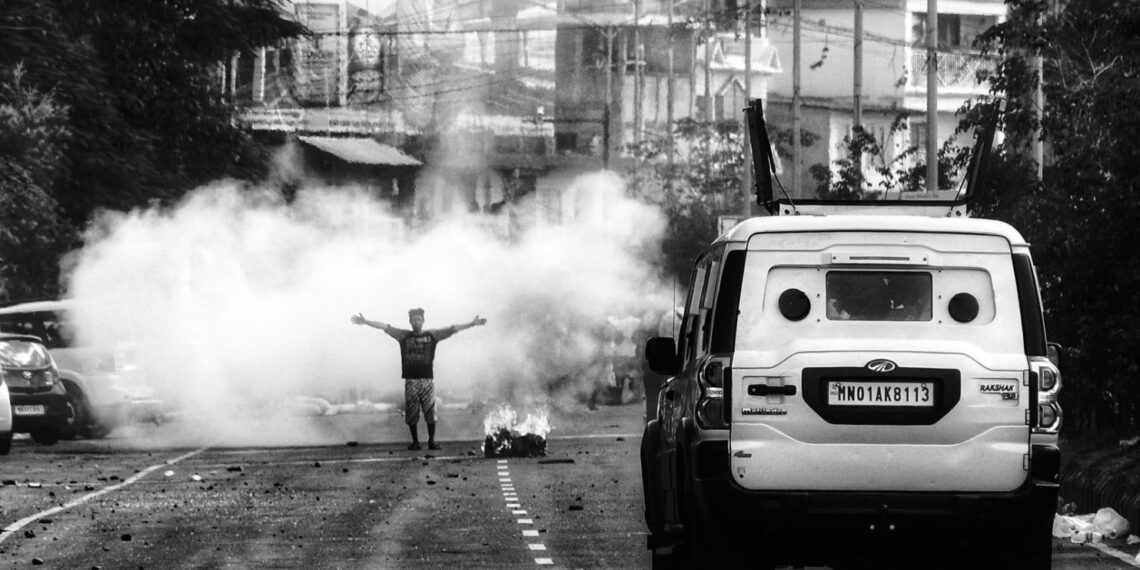Completing the first phase of his study trip to Manipur, world renowned conflict theorist and bestselling author, Jaideep Saikia left the “Land of Emeralds” with a heavy heart. Jonathan Roy Tariang conducts the second part of the exclusive series of interview with Jaideep Saikia who is presently being termed as the “observed of all observers” in India’s national security domain. The fact that he has been able to call a spade a spade and had no reservations in criticising India’s national security managers for their ham-fisted handling of the situation in Manipur is both daring and showcased his die-hard belief in “nation first”.
Jonathan Roy Tariang: Sir, in the first part of the interview “Wail of the Sangai-I” (https://nenews.in/manipur/wail-of-the-sangai-i/3205/) you stated that it would be a while before “durable peace” is achieved in Manipur You have also referred to the spokesperson of the Indigenous Tribal Leaders Forum, Ginza Vualzong forwarding a narrative that the unrest could have been triggered by a right-wing Hindutuva agenda. Although you were not drawn into making a value judgment about Vualzong’s comment during the earlier interview, what does the observer of national security in you feels?
Jaideep Saikia: Jonathan, I have been a victim for having called a spade a spade. But if I am to continue travelling, interacting and writing without bias, I think I should not care about the consequences.
I am also aware that dispensations of all hues do not brook criticism. I have always been perturbed by the fact that there is something inherently wrong if a national security manager of the country is not listening to suggestions and the grouse that is emanating from the ground. In fact, he/she has embraced the worst kind of moral turpitude. He has failed his countrymen. He is responsible for the deaths of hundreds of people in Manipur and the ruinment of a province that—despite underlying ethnic dissonances for decades—had been hailed as the “bejeweled land”.
Manipur poses very complex issues and it is not easy to understand the dynamics that govern it. But there should have at least been an effort to be educated. A national security manager should possess the humility to travel, read, meet and learn. I am afraid, in the scheme of things—and I never tire from bringing this aspect to the fore—such a national security manager should, if he has an iota of self-respect, just quit.
JRT: But is there an agenda?
JS: There is certainly an agenda. Ethnic cleansing is not a new concept. In the Manipur experience, aspects have been taken to sordid ends. I am still trying to unearth the methodology by which this is being done in Manipur. While I understand that land stands right in the middle of the conflict, sanity could well have thought about ways and means to correct that aberration. I have written about how the geographical setting of Manipur is the most important reason for the divide, but when cartography is the factor at play, then prudence demands that innovative, out-of-the-box solutions are brought to bear in order to resolve the issue.
Look at the manner in which the Bodo versus outsiders—including the tea community of Lower Assam and the illegal migrants have fought over land in the past. I have visited Lower Assam and seen the dissonances at the time. I have visited the relief camps of the people who were fighting. A Santhal relief camp seemed no different from the ones I saw in Manipur. But in Assam, after a passage of time when both the sides realised that nothing was emerging from a meaningless conflict, they decided to relent. Of course, there were statesmen in Assam who had prepared a meeting ground. But here in Manipur, the narrative that I have been witnessed to from both sides is only to further division and a sense of acrimony that is deep-seated.
I met some intellectuals in Imphal on 6 October 2023, my last night in the state. The site was a gracious dinner that the Inspector General of the Assam Rifles (South) hosted for me. He had on my request invited three senior Meitei journalists including the redoubtable Pradip Phanjoubam. There was also the president of the All Manipur Working Journalists Union, Bijoy Kakchingtabam and a former minister of Manipur, Bijoy Koijam.
The IG (Assam Rifles) South who had hosted the dinner for me gave a brilliant proposal during the dinner. Maj Gen. Rajan Sharawat wondered whether it would not be a “Confidence-Building-Measure” of sorts were the media-folk belonging to the two communities, Meiteis and Kukis to come together in a third location such as Guwahati and met in a manner of a “Track Dialogue-II” dialogue. It could start a process that—while not trying to cobble out a solution—could meet, think and work out modalities by which the presently shut channels between the Meiteis and the Kukis could open. Journalists from Imphal could, once such a confidence has been gained, go to Kuki dominated areas and report. Naturally there is the issue of a natural apprehension that the armed organisations of both the communities would both prevent and discredit their respective media representatives. But it was agreed that courageous scribes—if they are desirous of peace—should rise above such threats. In any event, it remains to be seen whether the enthusiasm that this author was witness to in Gen.Sharwat’s dinner was simply tall talk or whether serious business was being contemplated.
JRT: But what about the right-wing Hindutuva agenda that certain Kuki leaders told you about?
JS: Land and years of animosity that had been coexisting and was simply being tolerated could well have been instigated by an alien agenda. There are efforts on in the North East and such other places where certain right-wingers have sought to further a false narrative that the North East was primarily a Hindu society which down the line was converted to Christianity. Last year a person with such a leaning visited me—he probably thought that since I had written a book on Islamist militancy in the North East India, I would be anti-Muslim or anti-Christian. I was bombarded by fables, legends and aspects of make-believe that were used as both logic and ammunition to prove his point that the North East way of life had always been Hindu and the present spread of Christianity was a conspiracy to alter the truth. On his way out of my apartment, he saw a Cross that was adorning my doorway—exquisitely carved by an artisan in Ukhrul and one which I was presented with during my visit to the Hills of Manipur last year. He suddenly asked “what is this doing here”. He even had the temerity to rock it as if the Holy Cross was a puppet. I was livid. I gave him a dressing down saying “don’t you know that He is the only divinity who willingly ascended the Cross so that others may live”. I showed him the door: I have never heard of the man or his ilk ever since.
JRT: Is there any truth in the fact that even Meitei Press and intellectuals are being biased?
JS: Unfortunately that seems to be the case. It is sad that righteousness has taken a back-seat in both sides of Manipur. Perhaps it is out of fear of being attacked or ostracised. But the fact of the matter one has witnessed a bias, especially among the Meiteis. Just look at the case of the human rights activist Babloo Loitongbam. He was attacked by the Meitei Leepun and the Arambai Tengol for speaking out aginst the inter-communal violence.

JRT: You visited a few relief camps and met members of the civil society. What were your takeaways?
JS: The relief camp I saw in Churachandpur continues to haunt me. 500 odd people of the Vaphei community crammed in a dilapidated building. There is lack of drinking water, medical facilities and no signs of warm clothing or blankets with winter approaching. I was told about pregnant and feeding mothers who are not being cared for. I fear an entire generation would grow up suffering from severe malnutrition. Indeed, apart from the Assam Rifles who are taking care of them, the cries of the relief camp inmates have fallen in deaf ears. There have been assurances of construction of make-shift houses and rehabilitation efforts. But nothing, nothing whatsoever has been done. The squalor, stench and most importantly the sorrow of having left behind a home and a life that they knew before May 2023 was palpable. I could not hold back my tears.
JRT: Who do you think is to blame?
JS: New Delhi and the central agencies who—if they had acted in time (3-4 may 2023)—are the ones to blame. But you know, Jonathan, nothing has been able to move them even after the passage of over five months.
JRT: Why?
JS: Because they just don’t care!















